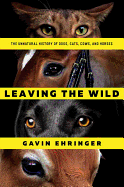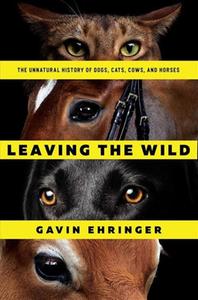
 Gavin Ehringer has been studying animals and writing about them for more than 25 years. He grew up next to a game farm and spent his young adult years working on a ranch; he is also an accomplished dog trainer. In Leaving the Wild, he explores four common animal species--those with which the author is most familiar--expressing his admiration and passion for these beautiful creatures who have given up the wild in order to share their lives with humans. "Understanding how once wild animals came to live in barnyards and under our roofs helps us... to better understand our own place in the world." Are people really living up to their end of the bargain in caring for and protecting these animals? Are humans making proper provisions for the well-being and ethical treatment of animals?
Gavin Ehringer has been studying animals and writing about them for more than 25 years. He grew up next to a game farm and spent his young adult years working on a ranch; he is also an accomplished dog trainer. In Leaving the Wild, he explores four common animal species--those with which the author is most familiar--expressing his admiration and passion for these beautiful creatures who have given up the wild in order to share their lives with humans. "Understanding how once wild animals came to live in barnyards and under our roofs helps us... to better understand our own place in the world." Are people really living up to their end of the bargain in caring for and protecting these animals? Are humans making proper provisions for the well-being and ethical treatment of animals?
Ehringer examines the history and evolution of each species. He then focuses on their class structures--working, feral, pet, show and industrial animals--and how they have partnered with humans, for better and for worse.
Dogs were the first to trade their wild existence for human companionship. Anchoring his timeline in the Ice Age, and spanning the globe, Ehringer chronicles the domestication of dogs; wolves and foxes not only tolerated humans, but also "sought their attention." He shows how cats, too, have served human purposes throughout the ages. Ancient Egyptians and Cyprians allowed wildcats to incorporate and ingratiate themselves into human life by offering their predatory skills in exchange for food and shelter. The commercial aspects of animals bind the sections on cows and horses--they serve mankind globally via agricultural and dairy farming, as well as the beef and herding industries. For every benefit these animals offer to humans, however, Ehringer points out multi-dimensional downsides and drawbacks: animal exploitation and lack of sustainability, abusive caring practices, unethical over-breeding that forsakes aspects of longevity and health, and the slippery slope of cloning and genetically modifying animal DNA. Often, when money enters the picture, moral and rational decisions are sadly forsaken.
Ehringer (100 Best Ranch Vacations in North America) makes a case that "animals who left the wild made a very good choice. Their value to us has ensured their survival." However, he also believes that "human values shape animals." In some instances, those values can be distorted and accountability can fall by the wayside. Thus, this informative, entertaining narrative raises red flags and outlines causes for concern. Animal devotees will be eager to explore Ehringer's interpretative research that blends a mixture of natural history, human history, personal experience and science. His engrossing study presents ways humans can set and maintain high ethical and moral standards for the breeding and care of our animal partners now and in the future. --Kathleen Gerard, blogger at Reading Between the Lines
Shelf Talker: A horseman and dog trainer maps the evolution of four species of animals and their partnerships with humans into the modern day.

